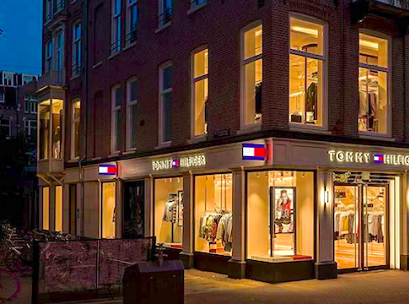PVH cuts forecast on tariff fears PVH Corp has cut its annual profit forecast by US10¢ a share as it grapples with tariffs, slowing retail growth and a strong US dollar. Following the announcement last week, shares immediately fell by almost 12 per cent, despite first-quarter revenue having risen 1.8 per cent to US$2.36 billion ($3.41 billion). PVH, formerly formerly known as the Phillips-Van Heusen Corporation, is a US clothing company that owns brands such as Van Heusen, Tommy Hilfiger, Calvi
ger, Calvin Klein, IZOD, Arrow, Warner’s, Olga, True & Co and Geoffrey Beene.
Earlier this month, US President Donald Trump escalated the trade war by raising tariffs on US$200 billion worth of Chinese goods to 25 per cent from 10 per cent. This was in addition to the 25 per cent tariff on US$50 billion worth of Chinese imports already in place.
PVH sources a majority of its apparel, footwear and accessories from China. In 2018, the company imported about US$400 million of inventory from the country.
Surf’s out for Abercrombie
Abercrombie & Fitch has forecast second-quarter sales below estimates, amid slowing demand for Hollister, the surf-themed brand that has fueled company growth over the last two years.
The company also said it would close three flagship stores, including a Hollister store in SoHo, New York City, incurring about US$45 million of lease-related charges in the second quarter.
Chief executive officer Fran Horowitz said fashion missteps at Hollister in Asia and the company’s failure to take full advantage of major promotional events on platforms such as China’s Tmall had hurt international sales, which fell 6 per cent.
Tariffs on Chinese goods are also an issue for Abercrombie. Last financial year, about 25 per cent of its globally sourced merchandise was imported from China, but Horowitz said the company was working to bring that down to 20 per cent this year.
Bed Bath & Beyond strikes deal
Struggling US home goods retailer Bed Bath & Beyond says it has reached an agreement with a group of activist investors that has been pushing for sweeping changes to its board and management.
The investor group had been piling on pressure since March, when it started demanding a new CEO and presented its own line-up of 10 directors.
But earlier this month, long-time chief executive officer Steven Temares stepped down and last week several other changes were made to the board, including four new independent directors, causing the investor group to withdraw its own slate.
Pepkor revenue disappoints
South African retailer Pepkor Holdings, formerly Steinhoff Africa Retail, has reported a smaller-than-expected 7 per cent rise in first-half revenue, as cash-strapped shoppers and the shift of Easter to April this year hit demand for clothing and general merchandise.
Retailers are struggling in South Africa as an increase in value-added tax, unemployment, and higher fuel and utility prices have reduced consumers’ appetite for spending.
Pepkor’s revenue for the six months ended March came in at 35.3 billion rand ($3.46 billion) compared with 33 billion rand in the same period last year, while operating profit before capital items rose 25.2 per cent. On a comparable basis, profit was up 6.9 per cent in the period.
Alibaba eyes Hong Kong listing
Alibaba, the Chinese multinational conglomerate holding company specialising in e-commerce, retail, internet and technology, is considering raising as much as US$20 billion ($29 billion) through a listing in Hong Kong in the second half of this year.
The move would follow the company’s record US$25 billion float in New York in 2014.
The Hong Kong deal would be the biggest follow-on share sale in seven years globally, according to Reuters, and would give Alibaba a war chest to keep investing in technology – a priority for China as growth flags and as the world’s second-largest economy is locked in a mounting trade war with the US.
While advisers and others close to the deal downplayed any trade war reasoning for the move, analysts said the context and geography could not be ignored.
“For Chinese companies listed in the US, one has to prepare a contingency plan,” said Hao Hong, head of research at broker BOCOM International.
Tycoon charged over assault
British retail tycoon Philip Green has been charged with four counts of misdemeanor assault in the US after an Arizona pilates instructor accused him of repeatedly touching her inappropriately, Britain’s Press Association has reported.
The billionaire chairman of Arcadia Group, Green, 67, is accused of spanking the instructor and grabbing her buttocks at the Canyon Ranch resort in Tucson in 2016 and 2018, according to the Pima County Attorney’s Office.
Green’s group operates some of the best-known clothing store chains in the UK and Ireland, including Topshop, Topman, Miss Selfridge and Dorothy Perkins.
The charges carry a sentence of up to 30 days in jail and a US$500 fine, the PA reports, citing Lauren Deakin, a deputy in the prosecutor’s office. Pima County court records posted online showed Green was due to appear for an arraignment hearing for the four charges on June 19, but the full criminal complaint was not immediately available.

